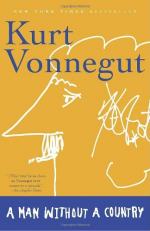|
This section contains 456 words (approx. 2 pages at 400 words per page) |

|
A Man Without a Country Summary & Study Guide Description
A Man Without a Country Summary & Study Guide includes comprehensive information and analysis to help you understand the book. This study guide contains the following sections:
This detailed literature summary also contains Topics for Discussion and a Free Quiz on A Man Without a Country by Kurt Vonnegut.
A Man Without a Country by Kurt Vonnegut is a collection of non-fiction essays reflecting on humor, politics, religion, education, prejudice, ignorance, the environment, art, war, and more. He tackles all of these issues in the twelve chapters/essays that compose this book, using a customary wit that has made him internationally famous.
While this novel is autobiographical, it is not a life story in the way that so many other autobiographies are, and therefore lacks a conventional plot line. Each chapter in this work can stand alone as an essay, though the common themes or overriding threads that tie the chapters together are the ideas that Vonnegut is trying to put forth. One of the key ideas Kurt Vonnegut discusses, and then reiterates, throughout the entire work is that humor is a natural defense mechanism to deal with all the horrible things in the world we live in. While defying the natural plot would be common for most works, there is still a sense of movement.
Vonnegut's first essay discusses his life as a soldier, young, just a kid, and the experience of taking cover, listening to the bombs hit overhead. The beginning thus suggests youth, and as the essays move on there is a sense of aging, even though Vonnegut loves to jump back and forth chronologically, sometimes by decades in the same chapter. Questions are posed concerning war, politics, and humanity, in general. Vonnegut is very quick to compare his experiences fighting in World War II, generally considered the epitome of the definition of a moral war. He also says that the United States' war in Iraq is nothing like World War II. Vonnegut's experiences as a soldier gives him credibility on these matters, as he also spirals off into discussions on religion, the teachings of Jesus, the environment and horrible things that humanity does to it.
The plot is an evolving, overriding series of arguments. Discussions include everything from why oil is the worst addiction possible, to the need to just be kind to other people above all else. Vonnegut covers every topic, every angle, and he refuses to look at them just once. In a way, the book is like living life, and watching in your mind old memories as they come and go, even as you march forward in what is the here and the now. In the end, the plot of this book is Kurt Vonnegut's search for a solution, a country, an identity, or even a hope of any kind. It is in that walk, that very reflection of life itself, that this book takes its arc, and Vonnegut provides at least one more gift for his readers, as good as any before it.
Read more from the Study Guide
|
This section contains 456 words (approx. 2 pages at 400 words per page) |

|



